

The Bible. The Bible (Hebrew: תנ״ך tanakh, Greek: η Βίβλος hē biblos) (sometimes The Holy Bible, The Book, Word of God, The Word Scripture, Scripture), from Greek (τα) βίβλια, (ta) biblia, "(the) books", is the name used by Jews and Christians for their (differing but overlapping) canons of sacred texts. For most Christians, it refers to the combination of Hebrew Scripture (known to Christians as the "Old Testament" or "First" Testament, the Apocrypha/Deuterocanon (various writings important in the Second-Temple period of Judaism), and the "New Testament," describing the life and message of Jesus. For Jews, it refers to the Hebrew Bible. Many Christian English speakers refer to the Bible as "the good book. " Christianity and Judaism regard the Bible as the revealed word of God, with widespread variation on what this means or to what extent (or what books) it applies.
Terms and Names in the HEBREW BIBLE (I) Hebrew Bible (Jewish sacred writings) - Britannica Online Encyclopedia. From Jesus To Christ - The First Christians. In his teaching, Jesus often quoted the Jewish Scriptures; after his death, his followers turned to them for clues to the meaning of his life and message.

Biblical scholar Mark Hamilton discusses the history of these ancient texts and their significance for early Christians and their Jewish contemporaries. Mark Hamilton is currently writing a PhD dissertation at Harvard University called 'The Body Royal: Kingship and Masculinity in Ancient Israel.' The 24 Books of the Hebrew Bible. In their simplest form, the twenty-four books of the Jewish Bible - the Tanach - present a history of the first 3500 years from creation until the building of the second Temple in Jerusalem.

The books also relate the history of the Jewish nation from its earliest stage, through the giving of the Law at Mount Sinai, and until the end of the first commonwealth. But the Tanach is much more than just history. In it one can learn about G-d's plan for the world and of His relationship with mankind, specifically, His chosen nation - the Jews. Here is where G-d tells us what He wants us to do! Torah. The word "Torah" is a tricky one, because it can mean different things in different contexts.
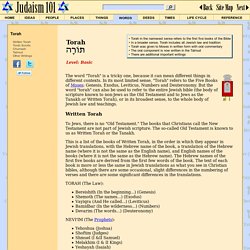
In its most limited sense, "Torah" refers to the Five Books of Moses: Genesis, Exodus, Leviticus, Numbers and Deuteronomy. But the word "torah" can also be used to refer to the entire Jewish bible (the body of scripture known to non-Jews as the Old Testament and to Jews as the Tanakh or Written Torah), or in its broadest sense, to the whole body of Jewish law and teachings. Written Torah To Jews, there is no "Old Testament. " Jewish Fairy Tales and Legends Index. JUDAISM MYTHS - The Ten Biggest Myths of Judaism. Jewish Myth, Magic, and Mysticism.
Different types of Jewish Mysticism. In all religious traditions there is a mystical form of worship.
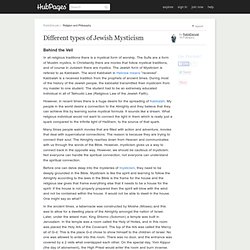
The Sufis are a form of Muslim mystics, in Christianity there are monks that follow mystical traditions, and of course in Judaism there are mystics. The Jewish form of Mysticism is refered to as Kabbalah. The word Kabbalah in Hebrew means “received”. Kabbalah is a received tradition from the prophets of ancient times. Zionism, Judaism, and the Jewish People. Zionism As Judaism By Robert Wolfe There exist innumerable definitions of Zionism.
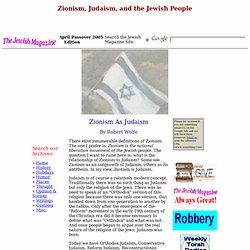
The Land of Israel. The Promised Land The history of the Jewish people begins with Abraham, and the story of Abraham begins when G-d tells him to leave his homeland, promising Abraham and his descendants a new home in the land of Canaan.
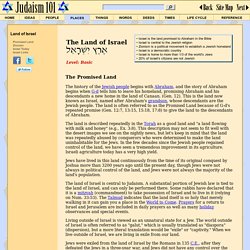
(Gen. 12). This is the land now known as Israel, named after Abraham's grandson, whose descendants are the Jewish people. The land is often referred to as the Promised Land because of G-d's repeated promise (Gen. 12:7, 13:15, 15:18, 17:8) to give the land to the descendants of Abraham. The land is described repeatedly in the Torah as a good land and "a land flowing with milk and honey" (e.g., Ex. 3:8). A Brief History of the Jews. Search Results for: Something for Everyone.

An Introduction to Judaism: History, Religion, Jews, Israel and Scriptures. Judaism is the religion commonly linked to Jewish people.

History of Judaism. 92KGoogle +
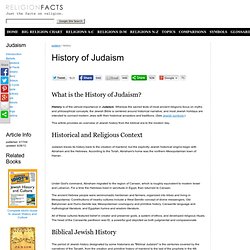
What is Zionism. Answer Zionism was (and is) the movement to establish and preserve a Jewish homeland.
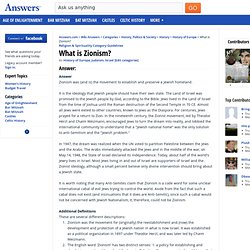
It is the ideology that Jewish people should have their own state. The Hidden History of Zionism. History of zionism. Zionism and the Creation of Israel - Definition and History. Zionism and Judaism - Opponents of Zionism and anti-Semites have sometimes identified all Jews as "Zionists" and used the terms "Jew" and Zionist interchangeably. For example, the Hamas charter lays the blame for the French Revolution on "Zionists" - though there were no Zionists in the 18th century. They clearly mean "Jews. " Conversely, others have claimed that Zionism is not, and was never, representative of views of the majority of Jews. From its inception, Zionism enjoyed wide popular support, particular in Eastern Europe and Russia. Most German Jews were probably not Zionists, but Germany was the center of the Zionist movement for many years.
Background his* Zionism did not spring full blown from a void with the creation of the Zionist movement in 1897. Scripture Catholic - Zionism. Zionism is a movement that seeks a spiritual and national restoration of Israel, the land of the Jewish people. Specifically, Zionists believe that the Jews have a divine right to the real estate it formerly possessed during the reign of King Solomon, based on the promises that God made to Abraham in the book of Genesis: “On that day the LORD made a covenant with Abram, saying, "To your descendants I give this land, from the river of Egypt to the great river, the river Euphra'tes, the land of the Ken'ites, the Ken'izzites, the Kad'monites, the Hittites, the Per'izzites, the Reph'aim, the Amorites, the Canaanites, the Gir'gashites and the Jeb'usites.”
(Gen. 15:18-21). Zionism is part of a greater eschatological worldview that sees the restoration of Israel as a sign of the end-times (this is often called “Dispensational pre-millennialism”). This schema of events can be summarized as follows: Pre mid post (Rapture) A Basic History of Zionism and its Relation to Judaism. A Basic History of Zionism and its Relation to Judaism By Hanna Braun, London First Published: September 2001: In order to understand the circumstances that led to the birth of Zionism I shall sketch an outline of the history of Judaism and the Jews.
Since biblical times Jewish communities lived in Arab lands, in Persia, India, East and North Africa and indeed in Palestine. Difference between Judaism and Zionism. The Difference Between Judaism and ZionismG. Neuburger. What Are The Basic Jewish Religious Beliefs? The Jewish Outreach Institute. What are the different denominations (types) of Judaism? In North America today, the four main branches of Judaism are Orthodox, Conservative, Reform, and Reconstructionist. Within these denominations themselves, however, there is a great degree of variation in practice and observance. Orthodoxy is the modern classification for the traditional section of Jewry that upholds the halakhic way of life as illustrated in a divinely ordained Torah. Halakha refers to the legal aspect of Judaism, and is also used to indicate a definitive ruling in any particular area of Jewish law. The Destruction of the First Holy Temple - History. Two Temples stood in succession on the Temple Mount in Jerusalem.
The First Temple was constructed by King Solomon, based on detailed plans that G‑d had given to his father, King David through the prophet Nathan. King David had wanted to build it himself, but was told that his son would be the one to do it. Four different kinds of Judaism: Undefined Four different kinds of Judaism: 1. Reform Judaism (its site) Theology: Judaism. History, Beliefs of Jewish Religion / Jews. Who is the bravest hero? He who turns his enemy into a friend. Judge not thy neighbor until thou art come into his place. (Jewish Proverbs) Introduction to Judaism. Jesus and the land promise. Can Zionism deliver? Who Were the Hebrews? By Gerald A. Larue. The Biblical Hebrews in conflict with their Neighbors. The word Hebrew has been associated with the word Hiberu and Apiru, described in Wikipedia as " the name given by various Sumerian, Egyptian, Akkadian, Hittite, Mitanni, and Ugaritic sources (dated, roughly, from before 2000 BC to around 1200 BC) to a group of people living as nomadic invaders in areas of the Fertile Crescent from Northeastern Mesopotamia and Iran to the borders of Egypt in Canaan.
" The History of the Hebrew People. Highlands Ranch High School - Mr. Sedivy Highlands Ranch, Colorado. HEBREW MYTHOLOGY.